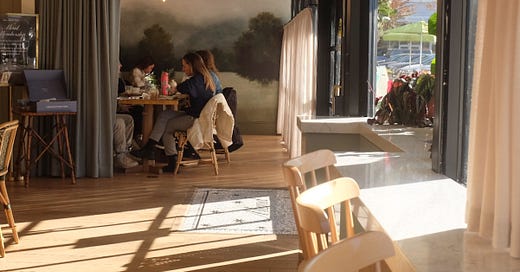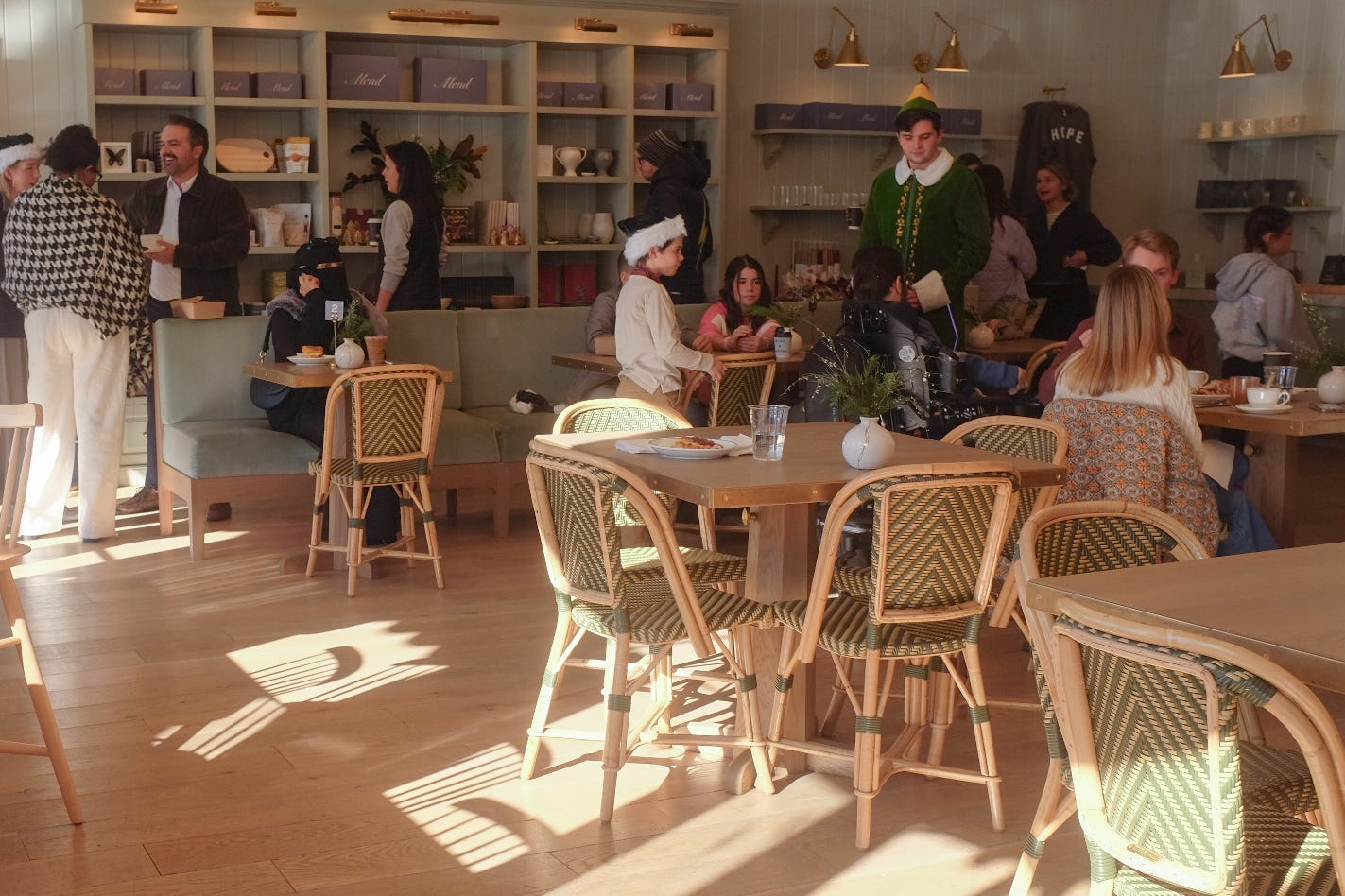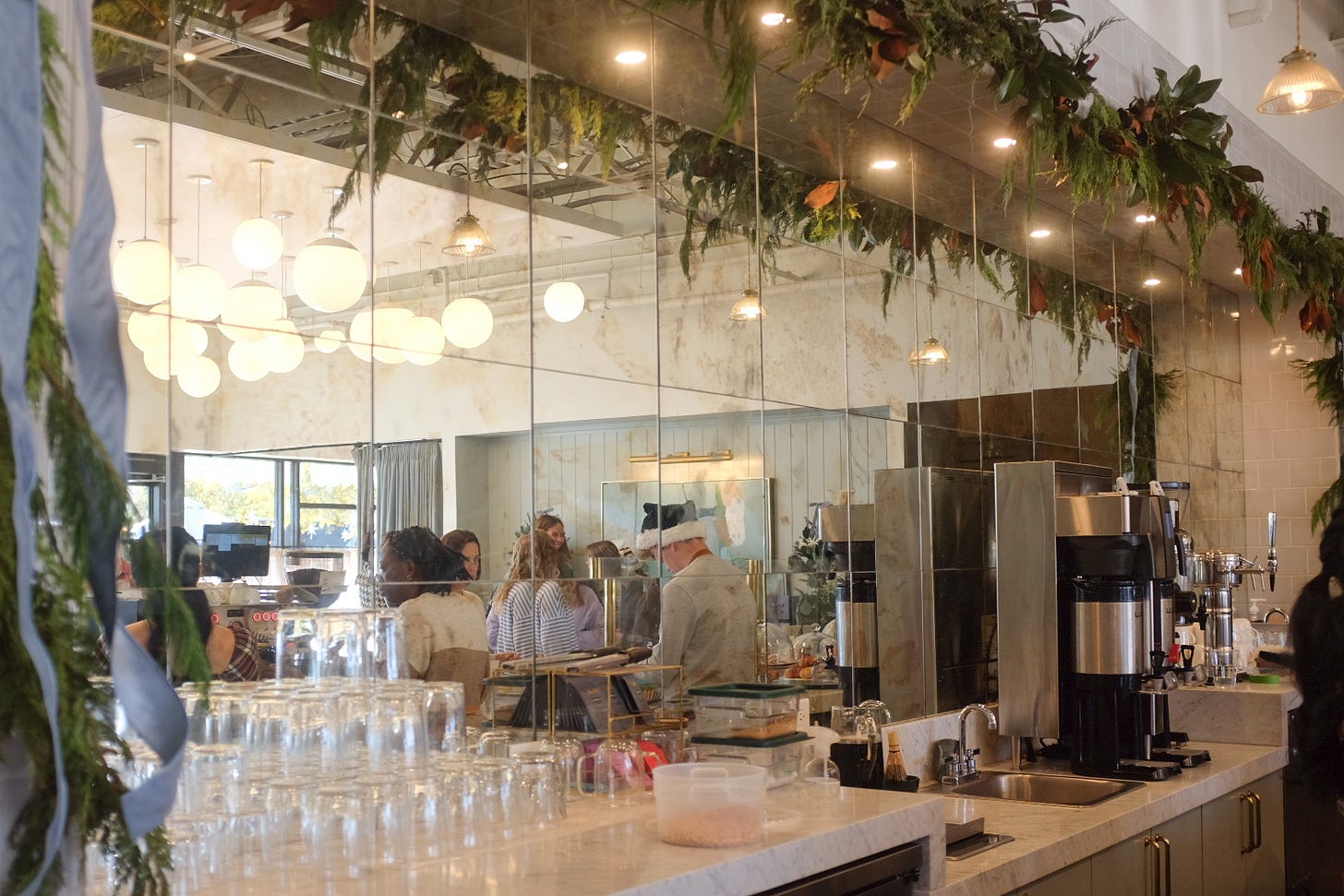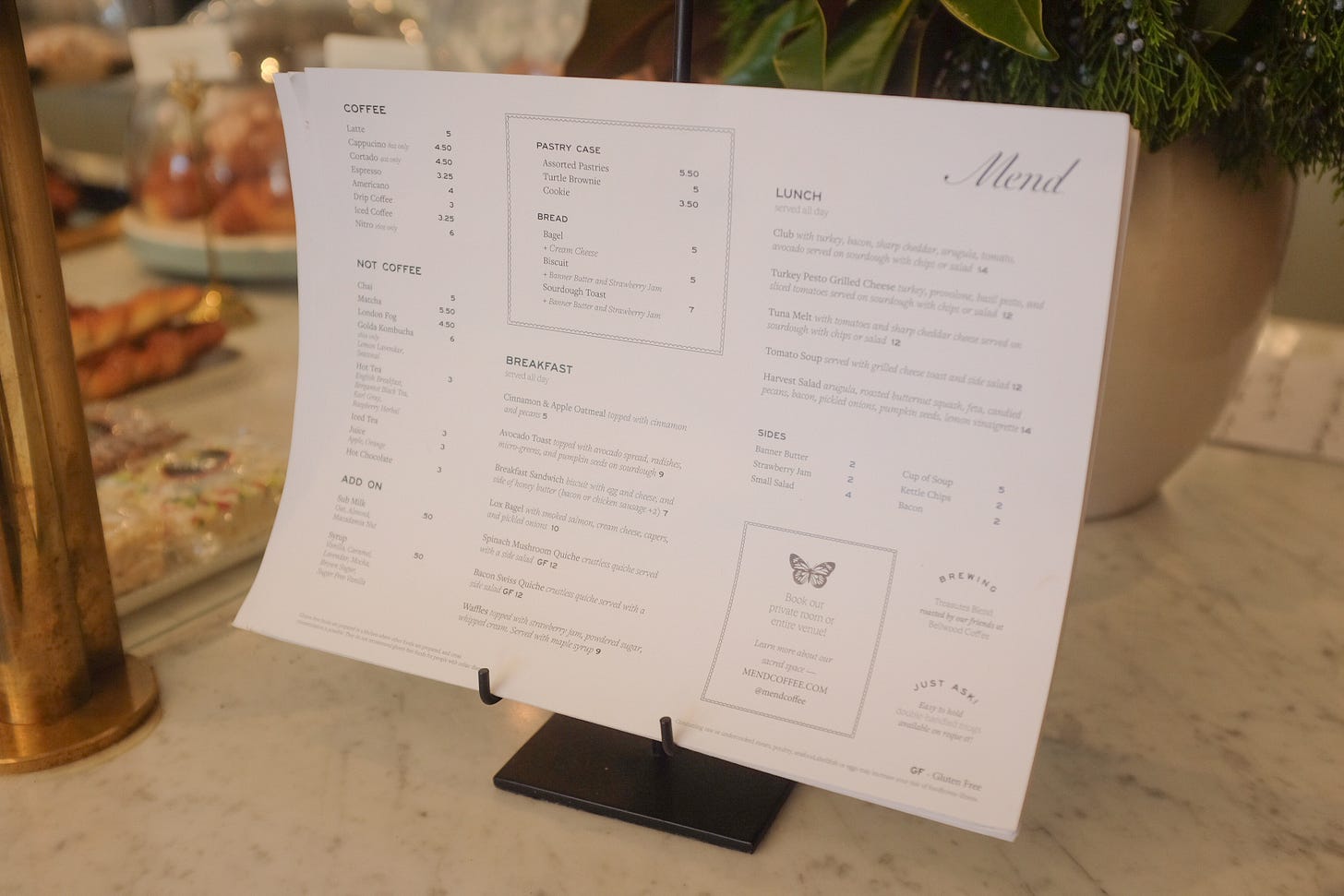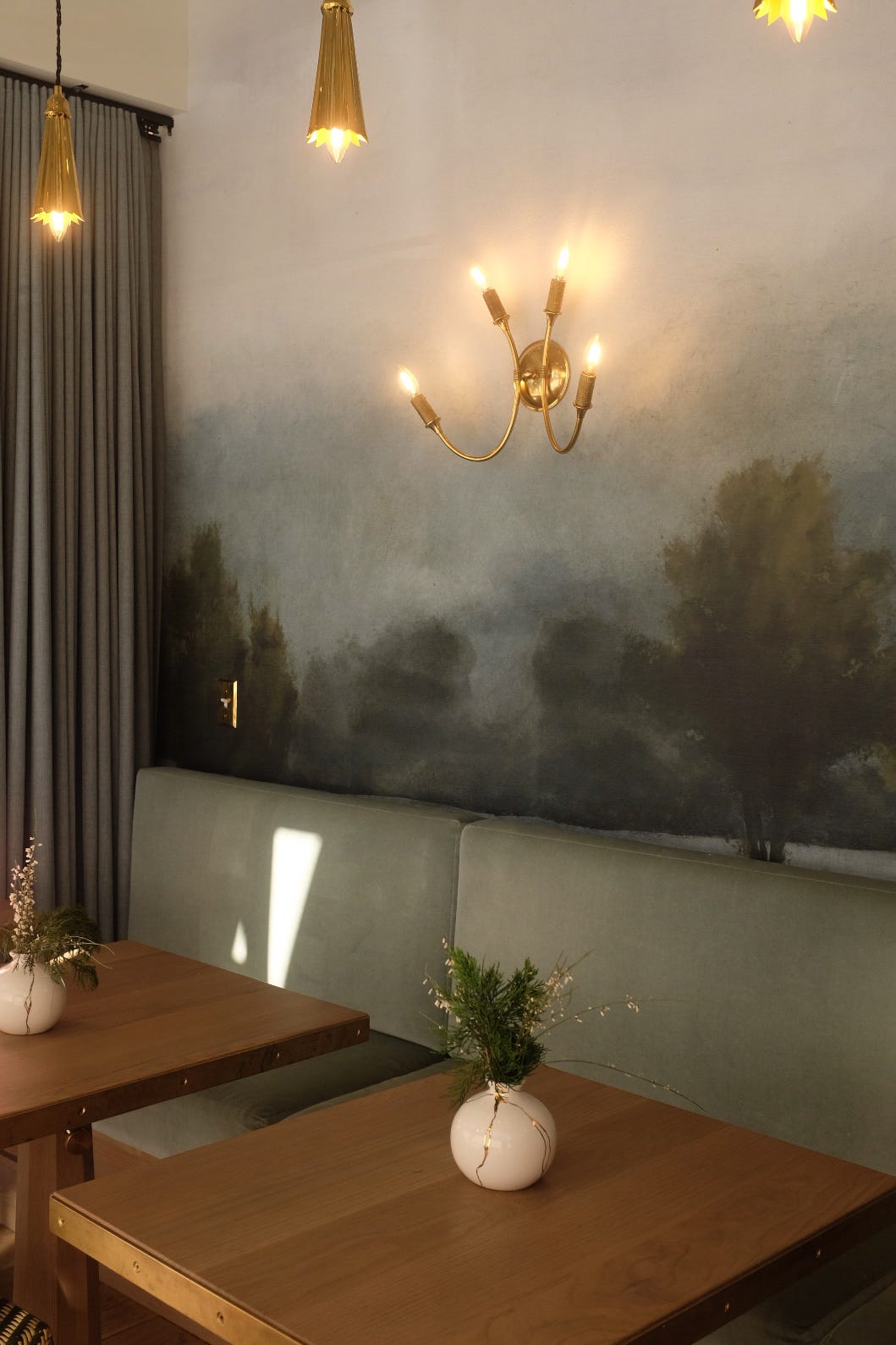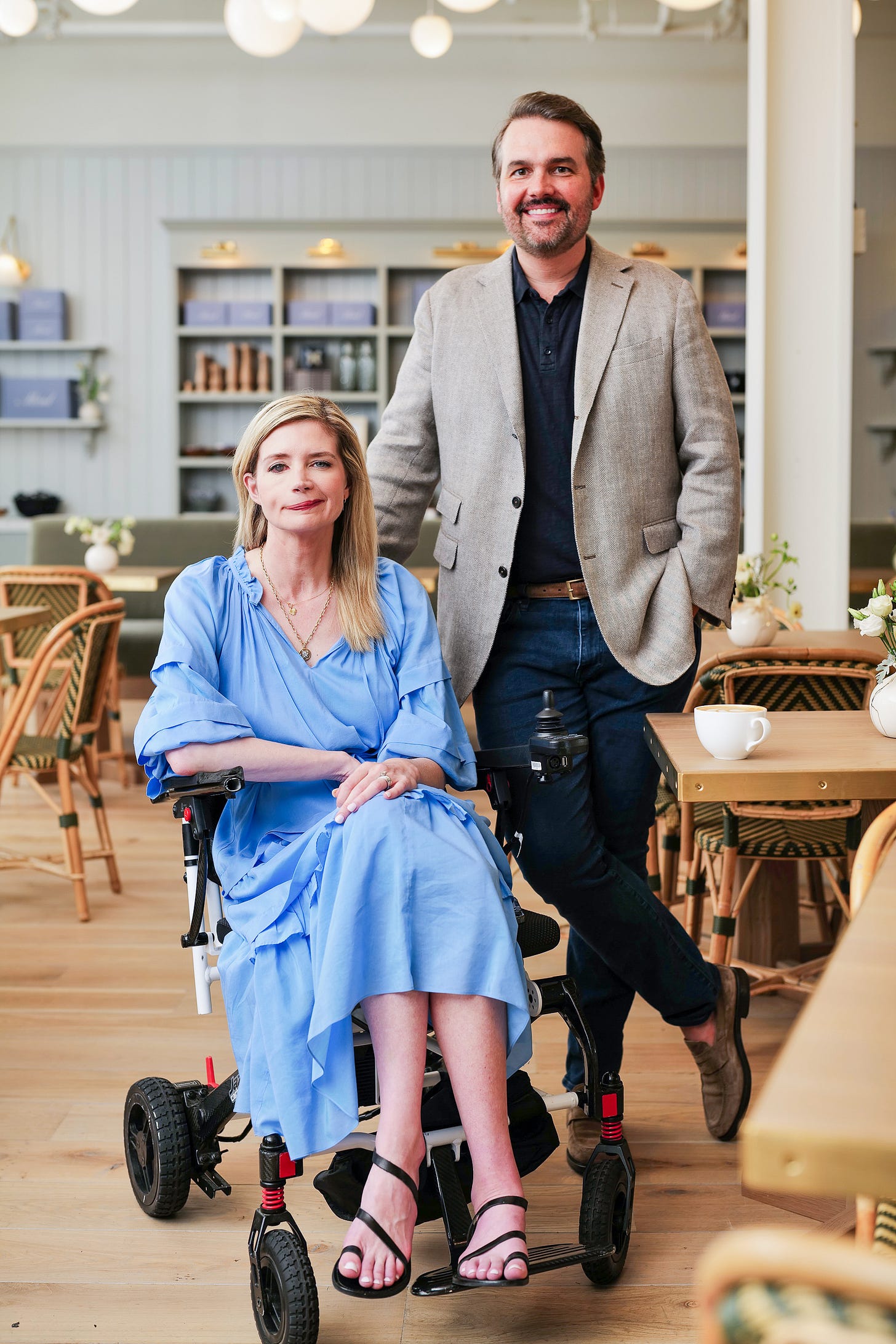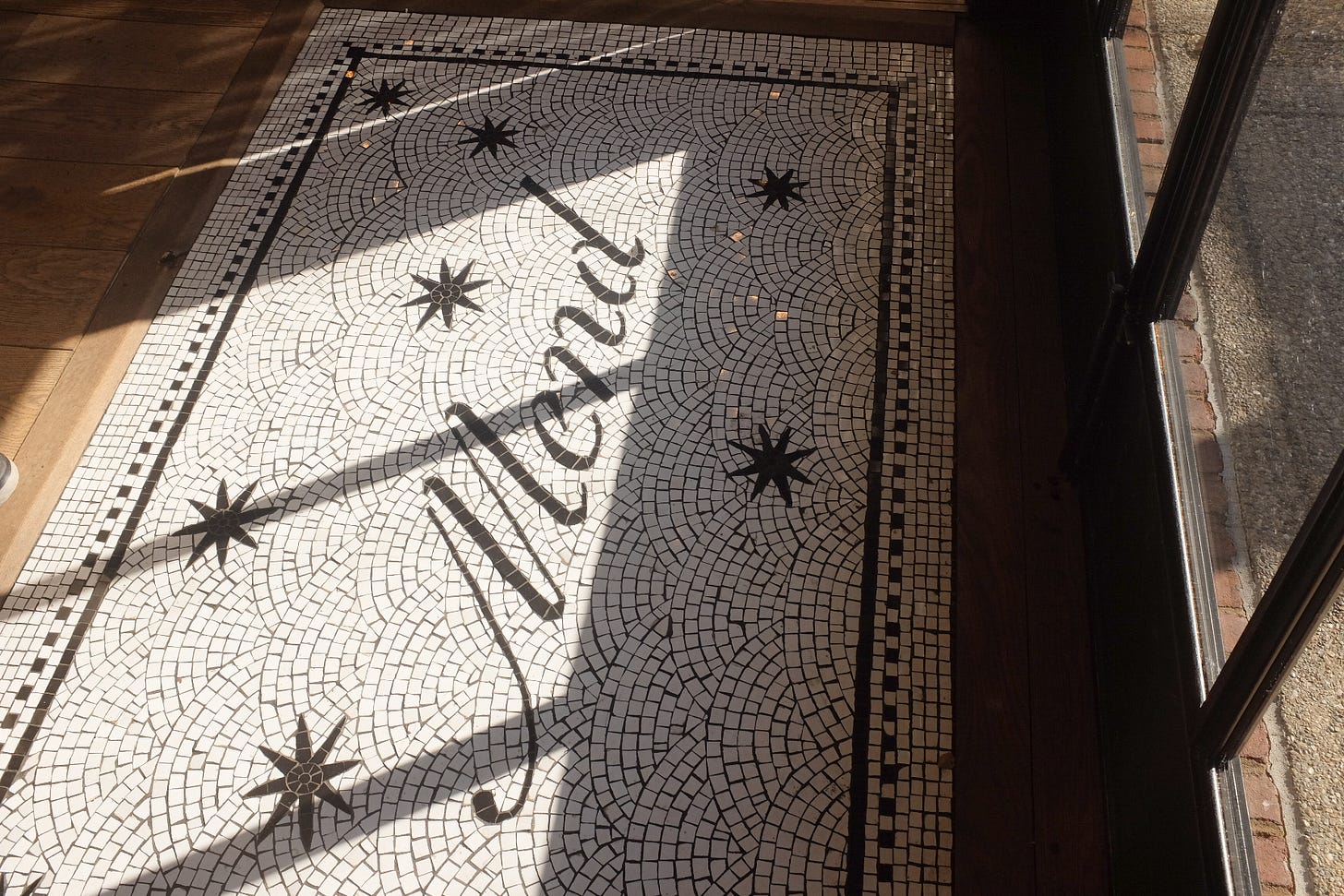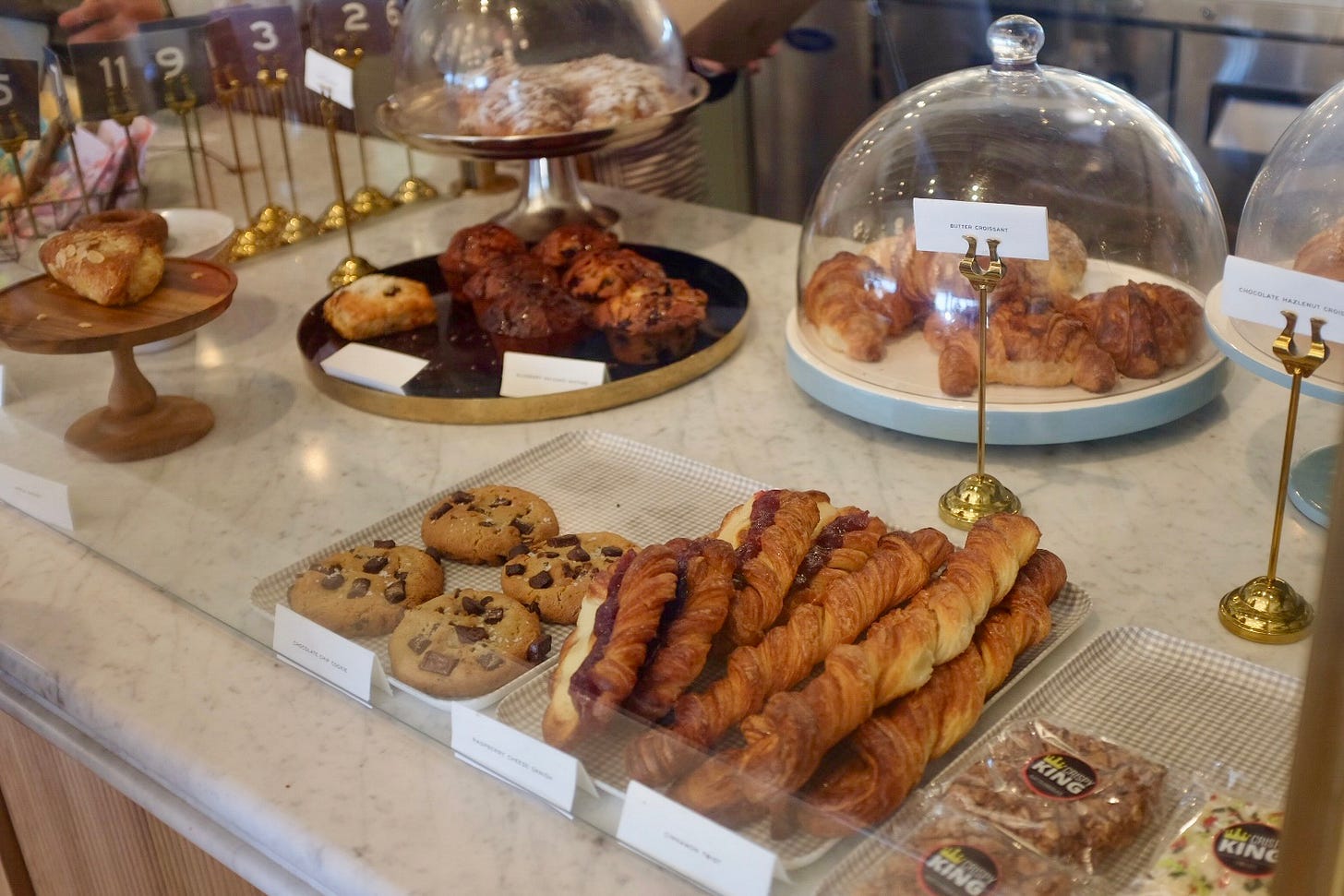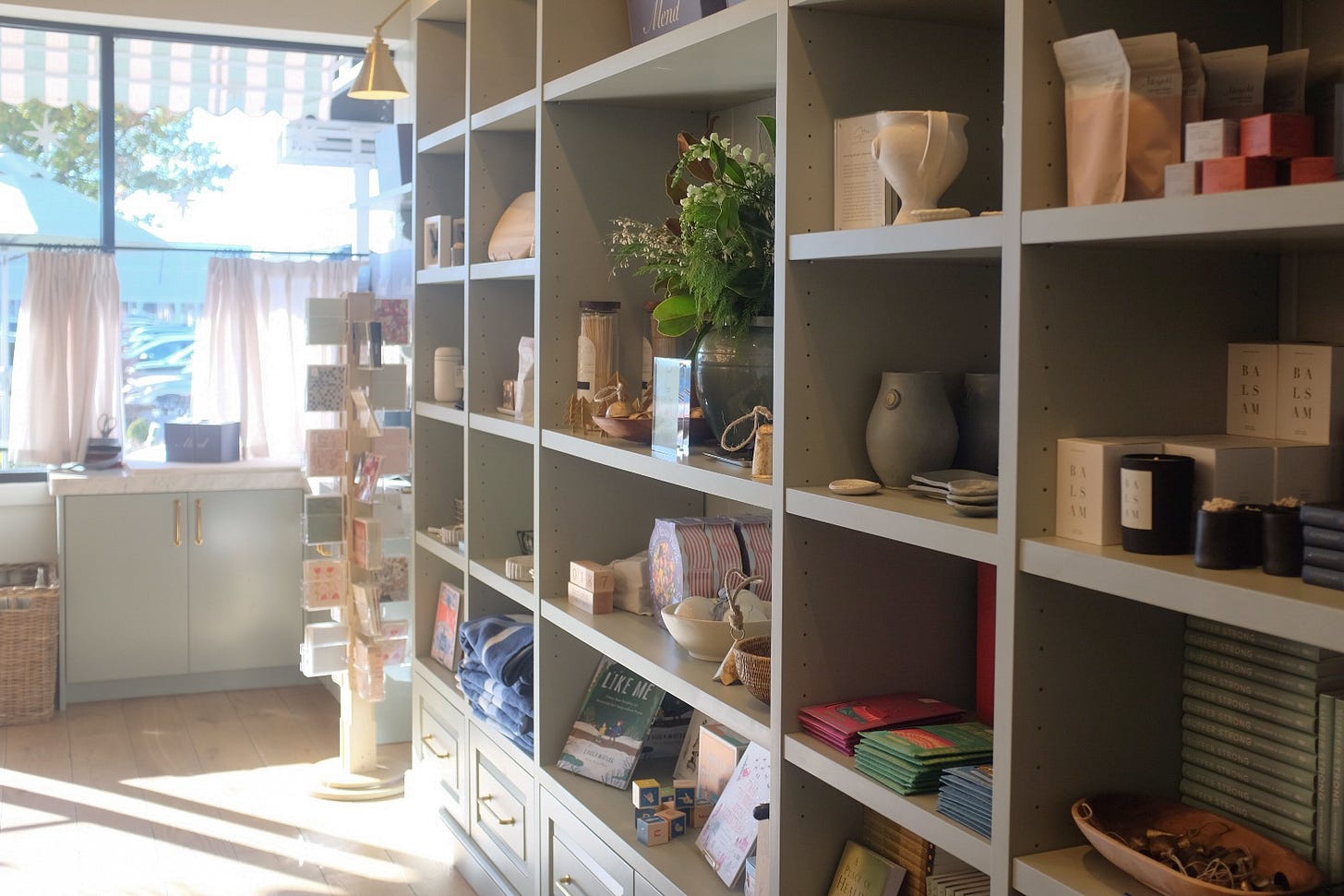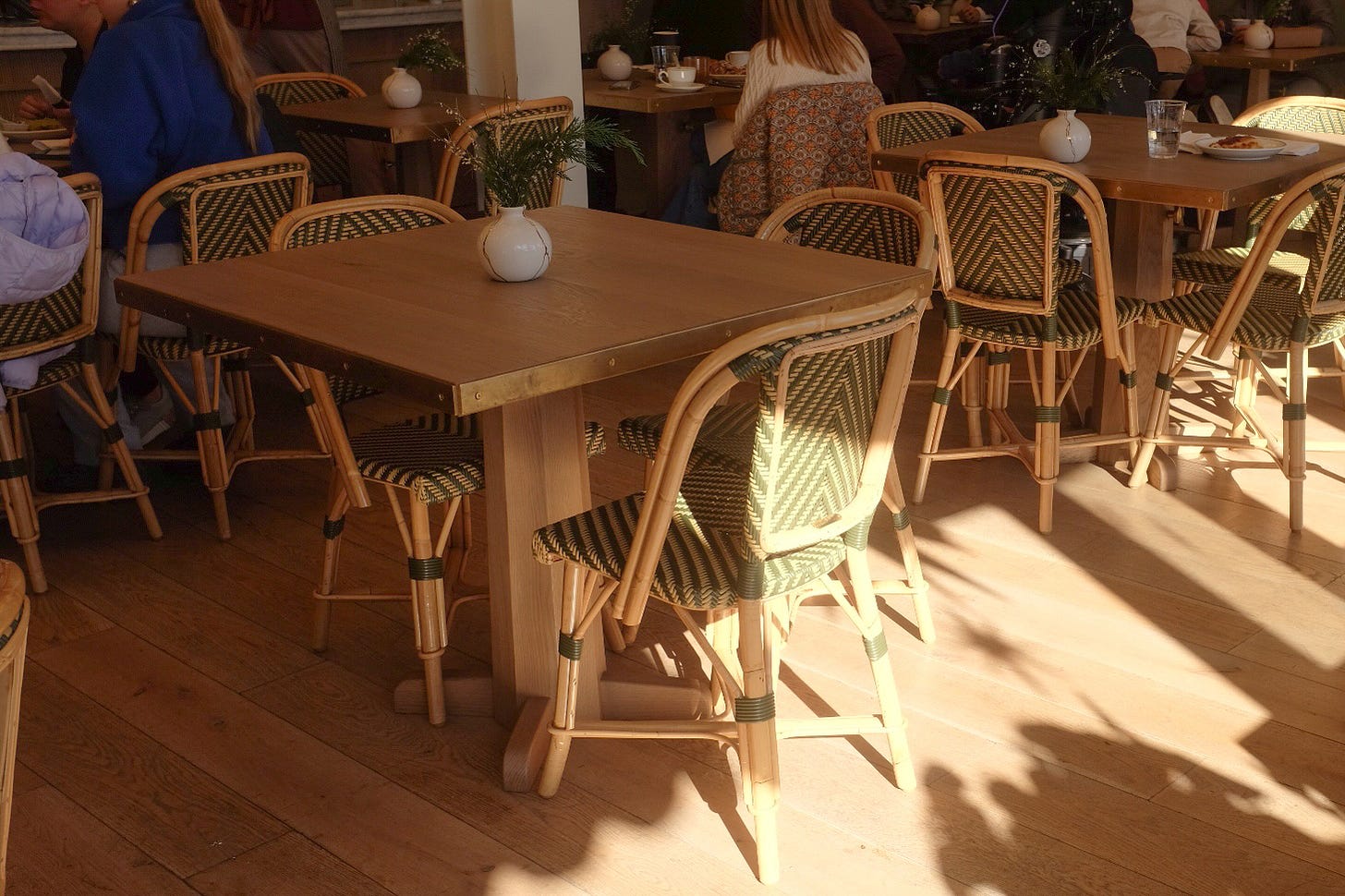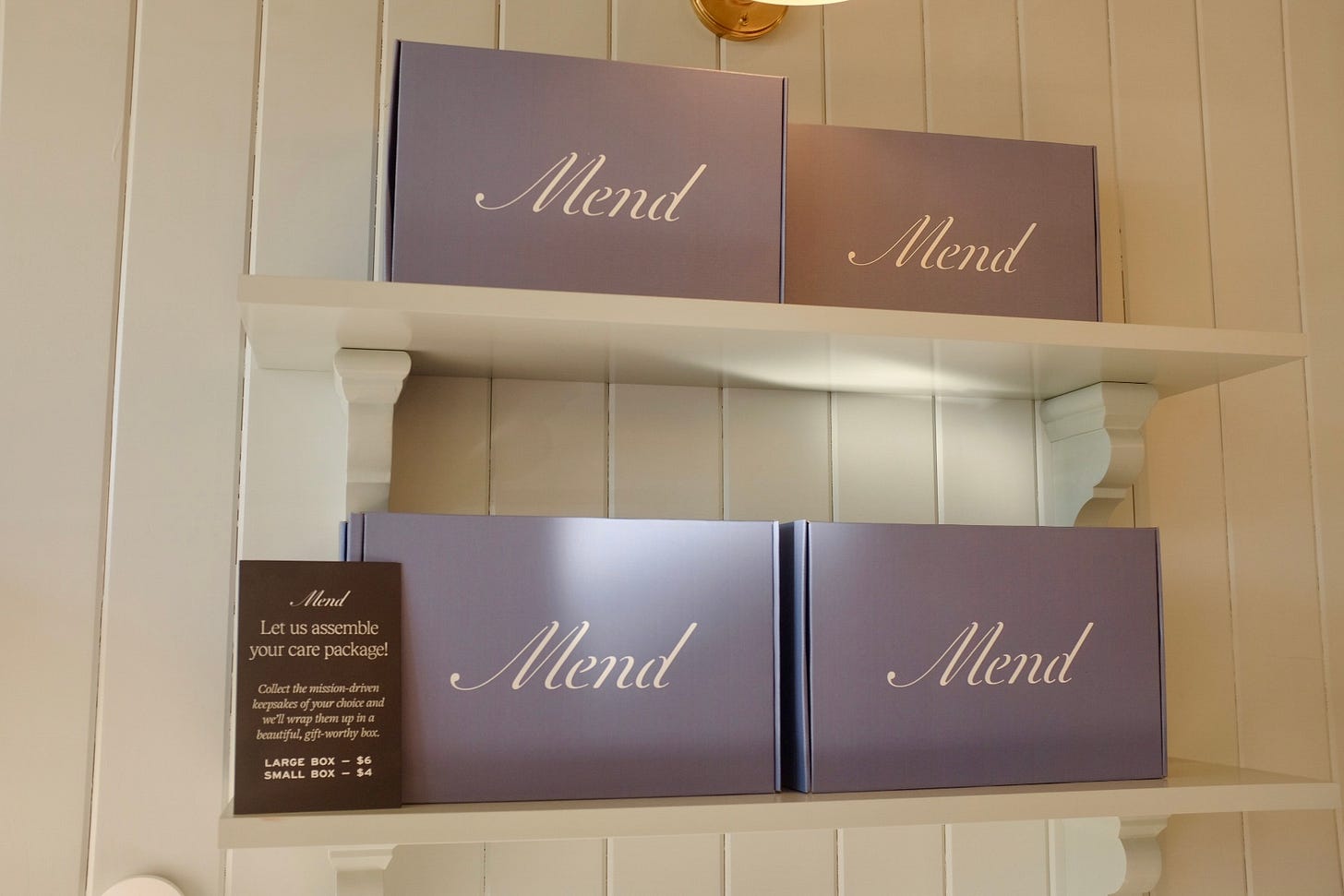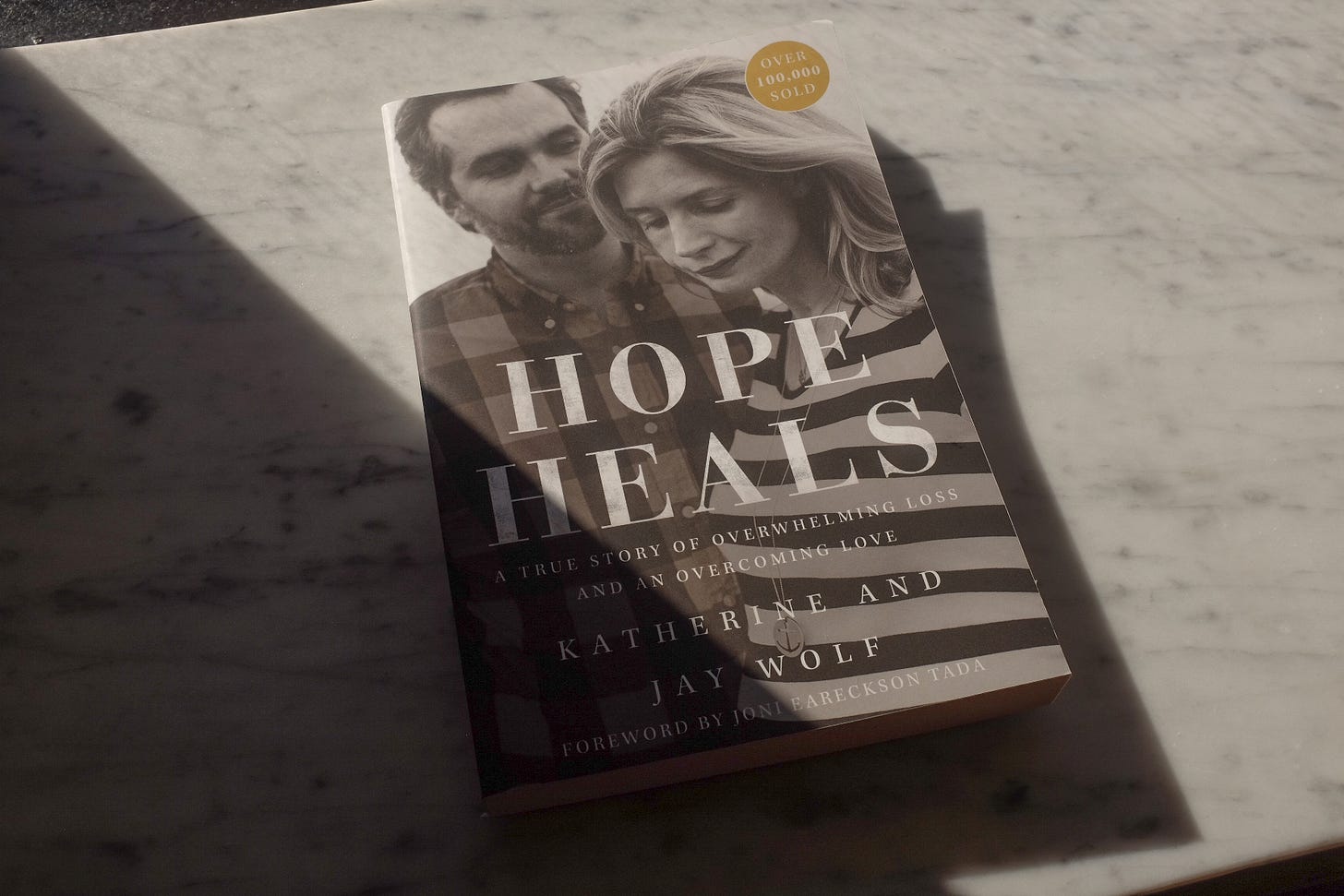Often, we have a tendency to associate joy as something separate from hardship. Yet hardship often times reveals a greater appreciation for even the small moments in life. Mend Coffee, is a café that began from the lives of Jay and Katherine Wolf, a couple who has experienced an unexpected pain in their lives in a way most never will. Katherine, at 26 years old, suffered from a massive stroke, causing her to become partially paralyzed. Since this moment, the Wolfs have worked to redeem each subtle moment of life worthy of joy. They first began a camp called Hope Heals to support those also affected by disabilities. Now, they’ve started Mend Coffee, to continue in ways to help support others who live a life with disabilities. A place accessible to all, and to lean into hope with one another. I spent time with Katherine and Jay, to share their approach to suffering, and give insight to their mission and story.
The Place: Mend Coffee
1. What’s the Story?
2. How is Mend Made Accessible?
3. What’s the Environment Like?
4. Who Will We Meet?
What’s the story of Mend Coffee?
Katherine- When I was 26 years old, I had a massive stroke out of nowhere. I was completely typically able-bodied, no health problems, no medical history, no family history, and had this terrible stroke, and very nearly died. I was in the hospital for many months and in rehab hospital for a year and a half.
I had to relearn to eat, speak, walk… everything, but even after over two years of basic rehab, I was still very much living in a disabled body now. Even though much had tremendously come back, I still can't drive a car. To this day, my eyes don't track and I have to use a walker or wheelchair to walk around most of the time. I kind of hobble and I have a hand that doesn't work and my face is paralyzed. Obviously there's still a lot that is disabled about my body.
So in years of writing, we've now written three books and have had many speaking opportunities. We founded Hope Heals, which is an overarching organization that actually owns Mend, and Hope Heals is our ministry, our faith-based nonprofit. Hope Heals eventually became a camp community, where we have families where someone has a disability, come to camp totally for free, and have like a retreat vacation. It's amazing. This camp community is just beautiful and electrifying for so many reasons.
We realized we really needed a brick and mortar spot in Atlanta, where we live, that would have that same ethos of people with disabilities on the outside and people who don't have disabilities on the outside, not only working together, but also the customer base being extremely friendly for those living with disabilities of all kinds, whether in wheelchairs, walkers, etc. but also, neurodivergent in every way.
So we have a lot of sensory considerations here. We have an adult changing table in the bathroom. We have tables that swivel up and down that wheelchair users can use at whatever size they need the table to be and much more. So we created a brick and mortar that is incredibly beautiful, but the heart behind the beauty is really providing a dignifying experience for people with disabilities.
In what ways has Mend been made fully accessible in its design?
Jay- So if we're doing some sort of mission-driven experience, or really sacred spaces, which is the name of the umbrella under which all this lies, whether at camp and even our online presence, and the coffee shop now, we're going to create a space that has this heart to invite everybody to the table and it has to be next level excellent.
It has to be beautiful and it has to be accessible. It's like, this is the camp that we personally want to go to and it's the coffee shop we want to go to as well. Even with all the “mission elements” aside, we just wanted to create a space we'd want to go and be a part of. We want a place to celebrate at, gather our friends around, and do work at of all things. So I think that was kind of the vision, is if that is the thing we're creating, then we have to build the space around those factors. Sort of a “if you build it, they will come.”
I think that unfortunately, we all have implicit biases, and a lot of times if you're a disability employment organization or even faith-based, then you're going to assume it's going to be less than. It's just not going to be as excellent of a business model. You may think the aesthetics won't be beautiful or it won't be ran as well. That’s just kind of across the board with how people view the combination of disability and faith, and it's just a double whammy of like “I'm going to expect less of this.” So we said, if we're going to do it, we want it to be excellent. We want the food to be the best it can be, we want that service to be incredible, and same of the aesthetics.
Now obviously when you're talking about accessible spaces, we've learned while being a part of the disability community now with Katherine, that normally, these spaces are very clinical, very medical, or sterile, and beauty is not the highest priority. We understand why that is, but it's like, “what if we could do both and show that that's possible?” The beauty and excellence aren't just because we're really intense people, but it's because that imbues dignity to everybody who experiences it.
Everybody who walks in the door, everybody who works here, you feel like “oh my gosh, I'm going to rise up to meet this space because it's clearly been made for me."
Much of the world, often disability advocates say, “the world is not made for me.” and so what if we can make a version, a little version of the world that is made for people with disabilities? The reality is however, when you do that, then you're actually making it better for everybody. This idea of curb cutouts, like on a sidewalk when you have a street crossing, the Americans with Disability Act kind of said, “hey, we need to create a very accessible way for a wheelchair to move across the street.” So it seems like it's just for wheelchairs, and it's like, “gosh, that's expensive” or “that's annoying.” However, the reality is, is it's also great for kids on skateboards, moms pushing strollers, older folks, people who maybe have visual impairments, and it’s actually this sort of overflow halo effect that when you have universal access, not just a ramp in the back by the dumpsters, but asking things like “hey, what if we made the front door easy for everybody?” Now we're all included.
That sort of thinking changes how we feel about what's possible in our lives, especially if we have challenges and struggles. It makes us feel more hopeful to venture out into the world, knowing that even if it's not made for us everywhere, but if it's made for me here, then maybe there's hope that other places will be too. But for now, I have a place in this world. So it's sort of multifaceted to say “we don't want the scraps for our friends with disabilities,” and frankly, anybody who's a human is on that spectrum of disability, and when you’re human, you're worthy of being here, and you're worth excellence, and beauty, and community, and people wanting to know you, and love you, and care for you.
So that's sort of the reason for the intentionality of design behind the space, such as having an adult changing table isn’t for every customer, but for the one in a hundred who come in. We would see them come out from recognizing them, sometimes weeping, because they've never seen a full-size adult changing table. It's worth it to us, for them to feel like they can hold their head up high, and go back out in the world that way. That was a huge part of this. That if we're going to do it, we wanted to do it at a level that would hopefully inspire people to feel like they could do this in their own business, their churches, or even local government.
What sort of environment does Mend aim to create?
Katherine- Mend truly aims to create a sacred space of belonging for all parties where anybody, regardless of ability, can feel like they are known, belong, seen and able to fully contribute regardless of how their body works.
Who are some of the individuals folks might meet here?
Katherine- So we have people covering almost every gambit from traumatic brain injuries, to people with major neuro differences, and sensory issues of all kinds. We have people with Down Syndrome, and people experiencing genetic conditions that are neurodegenerative. I think right now, we've got about 25 people on our team with MEND. I think what's cool is about half have a disability of some kind, and our mission again is not just to serve people with disabilities, but it’s also to create and to co-labor, so all have a seat at the same table. This is really the differentiator, is it's our mission to have an inter-ability community. It's kind of like representing our own personal story as a couple.
Jay- For example, Katherine is experiencing disabilities, but I’m not, however we're both giving and receiving in our relationship. It's not just one-sided. So we're representing that in this space with our customers too, of all abilities. Our team is made up of the most incredible mix of folks from all over the city.
There’s a lot of different stories and some hard stuff that's going on, but just like so much connection and joy and synergy that's bigger than the sum of their individual parts, which is really cool to see. We've only been open a few months, so we're really grateful to see how it goes from here.
We got our manager, Ashe, who is leading the charge so brilliantly, and she's been in coffee for probably about 10 years in the Atlanta area.
There's a lot of complications in this kind of a business model, but we're also paving the way to figure out how to make it sustainable here, as well as replicatable in other people's businesses. So she's doing an amazing job.
Elgin's kind of our front of house. Such a huge personality, and so kind. He's our barista extraordinaire.
Sia runs the back of the house. This is a coffee shop, but then we expanded because the customers wanted more food. It's more of a cafe now, really.
Griffin's another great person that folks would want to look out for. Griffin uses a wheelchair, and we've gotten to innovate how to help him have a little side tray. So now he doesn't have the use of his hands or feet, really, but he buses tables by getting folks help, which again, it's not just doing it for somebody, but it's doing it with them. So customers and other team members are helping him do a dignified job, but they're making it work for some of his needs. So it's really been cool to see this idea of co-laboring, not just charity. Less of “I’m going to do this for you,” but more, “we're doing something with each other.”
The People: Jay & Katherine Wolf
1. Who are the Wolfs?
2. Misconceptions about Disabilities?
3. What’s Your Motivation?
4. Will Your Work Ever Be Complete?
(Photo: Bryan Johnson)
Who are the Wolfs?
Katherine- So I'm from Athens, Georgia, born and raised, and we met and married after college in Birmingham at Samford, and we moved for 15 years to Los Angeles, California, and now we moved back and we've lived in Buckhead for six years, so that's kind of us geographically.
I love communication of all kinds. I love everything from a walkie-talkie off on my phone, to snail mail notes, to everything in between. I love talking and communicating. I love listening to books on Audible. I don't like reading as much, because my eyes don't work too well, so audio is better for me.
We have two kids, James and John are 16 and 9 years old, and we have been married 20 years on November 6th.
Jay- I’m from Montgomery, Alabama, and by way of DC, so that's sort of part of my background. For our two boys, James was born right before Katherine's stroke. He's about to be 17 now, and then we have John, who's nine. Our family spends a lot of time together, and we've recently, probably post-Paris Olympics, gotten to do our own family Olympics. That's kind of like our new tradition. It’s a lot of fun. It's like, you know, we've got our football in the yard, or playing horse on the basketball hoop, ping-pong, and we have a little weight lifting thing, and so it's just like our family loves to be together. So that's a lot of our hobbies right now. We love watching movies as a family, and just keep it kind of simple. We love to travel too. That's something Katherine does for her work a lot, especially this season. She speaks all over the place. It's a big part of our lives.
What’re some misconceptions about disabilities?
Katherine- One main one is just the objectification of a person who's in a wheelchair, must also have cognitive issues, or when someone may think they know, based on one particular disability, all about that person. Such as that someone who uses a wheelchair also can’t stand up and walk even a little bit. I can for example. It almost feels like people think I'm making up that I can't walk, when I’m using a wheelchair, but no, I'm not.
I can technically walk a tiny bit, but I very much need a wheelchair. I think in general, until you ask someone's specific journey of disability, you just don't know. I call it using curiosity without assumption.That's what we need in our world, people who are curious without assuming they know.
Jay- I think the idea of a disabled life being kind of one note is also a natural tendency that people just assume. It's really complicated when you think about healing and things like that. There’s just some bad theology, or philosophy around a hard story, whether it's you lost your job or maybe you had a kid with a particular diagnosis. Some remnants are still like, “well, you must have sinned or done something wrong.” Obviously, that's pretty tragic and damaging to just assume that somebody's life is solely based on their choices rather than just the reality of living in the world as it is.
However, on the other side of the spectrum, sometimes people with disabilities kind of get treated as though they're just this inspirational or almost infantilized sort, like, “oh, you're doing so well.” When sometimes, you're just like, “you know what, I'm just like a normal human. I've got drama and hopes.”
Not everything has to be some big inspirational moment, while someone is just trying to live. So it’s kind of finding that balance of saying, “yeah, there’s a special purpose for you still being in this story and alive against all odds, frankly, like us.
That's everybody really, if you have eyes to see it. Just to be human, it's kind of a miracle any of us are here.
So really reorienting the story of disability as being not that different from every human story. That’s really a facet of what it means to be human. Could I have a stroke someday myself? Yeah, I could. I could be in a car wreck, fall off the curb or any other serious situation that could leave me changed physically or mentally. The point to say, is that you don't have to be afraid of that reality in the same way, if you become in relationship and have more proximity to the story of disability, and no longer just view it as some tragedy or pity or inspiration, but just as a part of what it means to be alive. So that's something of what we've been learning and are still learning even to this day.
What motivates you to be so open about your story?
Katherine- There’s such a need, specifically within the disability population, for all the things that we hopefully are providing. Things such as community, a sense of belonging, meaningful work, a livable wage, and just the disability population so much has our hearts. So I think what motivates us, is those with disabilities in conjunction with our faith, motivating everything that we do, from our camp, our overall ministry, and specifically this coffee shop. I think that would be that working motivation.
Jay- So Katherine had a life that was turned upside down out of the blue, completely without warning. Then all of a sudden, you're a part of a population that is now often invisible in the world. So you've known what it's like to be “in charge of your own destiny,” and then all of a sudden that's changed.
The world now views you in a very different manner, almost exploitative or just invisible, and try to now sort of tell you, “here’s your story.” We've realized, “Hey, that's not only not how the story has to go, but you deserve to have a seat at this table.” So that for us, is motivating to re-center the story of disability as part of the story of what it means to be human, not just some sub category of the like.
Katherine often says, “make a bigger table, not a taller fence.” We've been privileged in our story and we wanna ask, “how can we tell this story well? Can we leverage what we've been given?” But also, do it in a wise way that's not making people feel less than about their story, but rather giving them permission to actually learn to love their story too.
Do you ever feel like your work will be complete?
Katherine- I mean, of course not. I don't think you're ever really done.
Jay- I think part of the mission is to create space. That's sort of an endless opportunity. I think in the same token, we both feel kind of at peace with our life and what we've been able to do, and with what shouldn't have even been. Now, 16 years later, it feels like we're living in a second chance story even still.
We still have the same kind of longings, anxiety, or even “oh my gosh, we don't have enough time to do all the things we need to do or we're supposed to do or we're called to do.” We still have that drive for sure, but I think we also feel pretty much at peace with how the story goes. It’s healthy to feel that tension, we've often said, of living with open hands, but wholeheartedness at the same time. We certainly can't control the outcomes. Hopefully MEND doesn't crash and burn. We don't think it's going to, but can we continue to open our hands from those expectations, and still show up to our life and to our mission with our whole hearts? That's the hard part. If you feel like your heart's been broken or you’ve been hurt, or you know the worst that can happen, it becomes hard to show up with your whole heart. Even with that tension constantly upon us, we want to show up. We want to be all in, but we want to hold it loosely too. That's where we kind of find ourselves related to the mission we believe we’ve been given.
Recommendations:
1. Discovering Purpose
2. How to Help
How can others discover their own purpose?
Katherine- I think the quest to find your “one purpose” is kind of barking up the wrong tree. There's purpose in just about anything you're going to devote yourself to, you know? Why not get busy doing something, and see if they feel purposeful in it? I say, “get busy and see what you find on the other side of giving your life away." It's powerful.
Jay- So often, I’ve seen, purpose comes in the place of your wounding. You may not necessarily want to go back into a space you've healed from or gotten past. It depends on the specifics, of course, but so often, that is actually the beginning of your new story. That can be an incredibly deep calling to help other people find hope.
For example, once you got out of rehab and recover to the best of your ability after something, you don't necessarily want to go back and be with other people who are in the same spot you were once in. It can be sad and sometimes even triggering, and you just want to get out of there. You may not want to remember all that darkness that you went through.
However, because you went through and came out of the other side, you get to be the one to go tell people that they can have hope to come out as well. It’s like a, “you’re coming with me” kind of a thing. So I think, start with your own pain and your own story.
Then, when the time is right, maybe that is the beginning of a new purpose and a calling that helps, not just something being about you and the thing you thought you were supposed to be doing. Instead, counterintuitively, through your own pain, that began to be the avenue to purpose. I think the idea is of not just finding your people, but finding the people who don't have people and making them your people.
That's a Katherine-ism. I think it's so good, because so often we're just like, “I don't fit in. I don't have community. I feel alone.” If that’s the case, then go. There's a lot of other people feeling that way too. Make a place for a new kind of community. That's kind of what we're doing here. It's deeply purpose filled.
How can others help?
Katherine- Well, the low-hanging fruit is to come get a coffee and support this incredible work by being a customer. If you want to do even more, you can become a Mend Member. It's a patronage model that supports the cost of our inter-ability staff while offering super valuable perks to our members—like free coffee and discounted retail and rentals. You can learn more at mendcoffee.com/membership." Much more than that, if people want to get involved in general in our organization, they can volunteer to work at our camp. That's an easy way to plug in to what we're doing. Subscribing to all things us and just following along is always extremely special and meaningful to us.
Jay- We have a non-profit, so we're always just trying to continue to support the work through support and donations. Like anything, if you love something in the world, be a patron of it. Tell your friends. When you see something good in the world that you love, be a big fan of it. We're very humbled that people come and make this place a part of their morning or kind of third place, as some call it. It's not work or home, but just a place to be. We've also got some community activation around here. We call it Hope Heals Hangouts. It's the same mission of just building relationship. No real agenda other than just being known and connecting and creating communities. So we're starting that as well, which people can participate in. We do it twice a month at Mend.
You can read more about the Wolf’s full story through their book Hope Heals.
